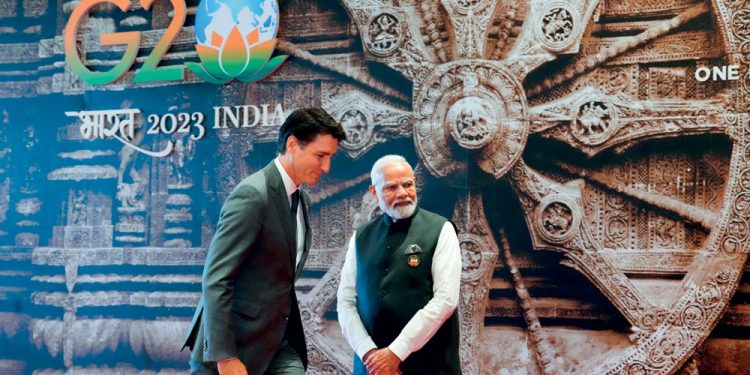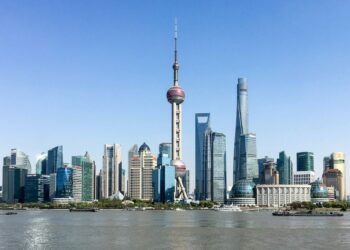Saira Bano, Thompson Rivers University
Canada-India relations have suffered a major setback after Canadian law enforcement authorities accused Indian agents of involvement in “homicides, extortion, and violent acts” on Canadian soil.
In response, Canada expelled six Indian diplomats, including High Commissioner Sanjay Kumar Verma.
In a tit-for-tat move, India expelled six Canadian diplomats, rejecting Canada’s allegations as “preposterous” and politically motivated, particularly given the Sikh diaspora’s political significance as a key voting bloc for Justin Trudeau’s Liberal government.
India has consistently denied the accusations and refused to co-operate with the Canadian investigation, which ultimately compelled the federal government to make these allegations public.
Trudeau has acknowledged the importance of maintaining strong relations with India, but condemned India’s actions targeting pro-Khalistan leaders as “unacceptable.”
But without a shared understanding of the pro-Khalistan issue, the relationship between the two countries is likely to remain strained. Both nations continue to approach the situation from fundamentally different perspectives.
Nijjar’s assassination fallout
Canada-India relations have been strained since Trudeau’s bombshell statement in September 2023, when he accused India of being involved in the assassination of Hardeep Singh Nijjar, a pro-Khalistan leader based in Canada.
The Khalistan movement is a separatist movement that aims to establish an independent Sikh state in northern India.
The assassination led to the expulsion of a senior Indian diplomat linked to the case and a rapid deterioration of bilateral ties, with India expelling Canadian diplomats and suspending visa services. India later demanded the repatriation of 41 Canadian diplomats, citing the principle of diplomatic parity.
India has long accused Canada of being too lenient on the Khalistan movement, which it views as a serious threat to its national security and territorial integrity.
The Sikh diaspora in Canada, the largest in the world, includes elements that have supported the pro-Khalistan cause, fuelling India’s concerns. Canada, however, emphasizes the right to freedom of expression, including peaceful protests, as a core tenet of its democratic values.
In a related incident, the United States revealed in November 2023 that it had thwarted an alleged Indian plot to assassinate a Sikh separatist leader in New York. This development, coupled with Trudeau’s statement in 2023 that there was “credible evidence” linking India to Nijjar’s slaying, has further substantiated concerns over India’s alleged covert actions targeting pro-Khalistan activists.
India’s strategic calculations
India’s strategic significance, particularly in counterbalancing China’s growing assertiveness in the Indo-Pacific region, adds complexity to its diplomatic relations.
India views its alliance with the United States as essential for safeguarding its interests, given the power imbalance with China. The U.S., in turn, sees India as a cornerstone of its Indo-Pacific strategy, with initiatives like the Quadrilateral Security Dialogue (Quad). It includes the U.S., India, Japan and Australia and is designed to promote the region as an “arc of democracy.”
Bipartisan support in the U.S. for deepening ties with India has led to expanding defence and economic partnerships, with a growing emphasis on technology transfer as a critical pillar of this relationship.
During Indian Prime Minister Narendra Modi’s state visit to Washington, D.C. in June 2023, President Joe Biden’s administration finalized an agreement for the joint production of General Electric (GE) F-414 jet engines.
At present, only four nations — the U.S., U.K., Russia and France — have the capability to manufacture jet engines, with China still lacking this advanced technology. The GE F-414 collaboration is intended to strengthen U.S.-India defence co-operation and improve their collective ability to counter China’s advancements in defence technology.
India also plays a central role in Canada’s Indo-Pacific strategy, unveiled in 2022. In the official document outlining the strategy, Ottawa described China as a “disruptive power” and emphasized the need to strengthen ties with Indo-Pacific nations, particularly India.
The strategy highlights “India’s growing strategic, economic, and demographic importance” as key to achieving Canada’s geo-strategic objectives. As part of this approach, Canada committed to negotiating a Comprehensive Economic Partnership Agreement with India. But due to the diplomatic tensions sparked by Canada’s allegations, these negotiations have been suspended.
The West’s disapproval
The Modi government may have calculated that India’s strategic value to the West would shield it from criticism over its handling of pro-Khalistani activists abroad. However, the unequivocal response from both the U.S. and Canada suggests otherwise, with the West making it clear that such actions are unacceptable, regardless of India’s strategic significance.
India will probably continue to deny Canada’s accusations and further sever diplomatic ties in an enduring dispute that will affect all aspects of the bilateral relationship.
From Canada’s perspective, Indian actions on Canadian soil represent a blatant violation of sovereignty. Ottawa expects co-operation and assurances from India that such transnational repression will not occur in the future. From India’s point of view, it’s a matter of national security issue as Canada appeases pro-Khalistan elements.
While the Indian diaspora has generally been an asset for the Modi government in fostering relations with western countries, the Sikh diaspora in Canada has been a significant hurdle in improving ties.
Without a common denominator to reconcile these differing perspectives, the relationship between the two countries is likely to remain strained, despite broader strategic factors that would otherwise encourage closer ties.
Saira Bano, Assistant Professor in Political Science, Thompson Rivers University
This article is republished from The Conversation under a Creative Commons license. Read the original article.











